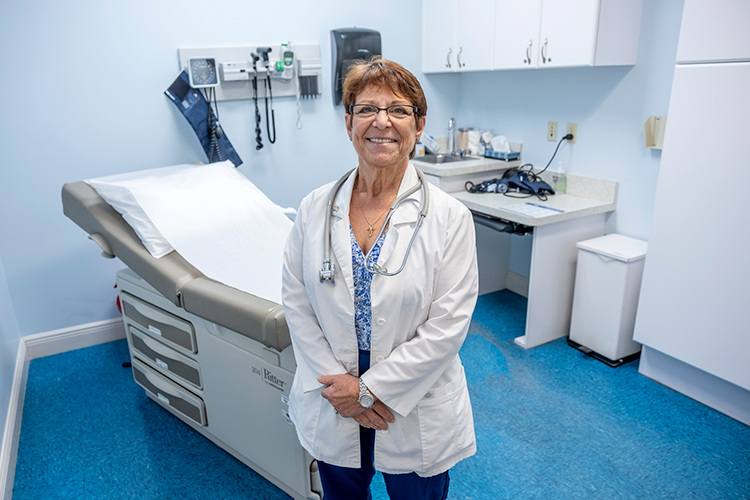
A multi-generational study of thousands of people begun in 1938 has determined unequivocally that the single most important factor keeping people happy and healthy into old age is good relationships.
“That definitely doesn’t surprise me,” says Dr. Denise Garee, a nurse practitioner for the Steward Medical Group, which owns Sebastian River Medical Center.
“If people aren’t in healthy social relationships, their whole life changes. It’s not uncommon for them to become depressed, which leads to hypochondria and feeling increased levels of pain.”
Begun 85 years ago with 724 young men from the Boston area with diverse backgrounds, the Harvard study “is the longest in-depth longitudinal study on human life ever done,” according to an article about the results the Atlantic. The study has maintained a participation rate of 84 percent with more than 1,300 male and female descendants of the original group (spanning three generations) still participating.
Those who were the most satisfied in their relationships when they were 50 were the healthiest, both mentally and physically, when they were 80. Loneliness on the other hand was associated with greater sensitivity to pain, suppression of the immune system, diminished brain function and less effective sleep.
Dr. Garee says it is a mistake to underestimate the value of being part of a community. “People, especially older people feel more vulnerable when they’re alone. Being in a group gives them a feeling of supporting each other.”
Fifty thousand years ago, being alone often was dangerous or even deadly and an isolated person’s body and brain would have gone into survival mode, heightening the release of stress hormones. Throughout evolution, that human characteristic remained unchanged and the same stressful reaction to loneliness exists now, regardless of age – even though physical danger from wild animals or hostile tribes has been reduced.
“Particularly in today’s society, it’s easy to become isolated,” says Dr. Garee. “Family members live in different states and the multi-generational connection is lost. Coupled with that, the older people get, the greater the chances that they don’t feel safe enough to go outside their comfort zone and socialize.”
It’s well-documented how social media and technology have changed face-to-face interactions. According to EarthWeb, an independent technology research outlet, the average American now spends several hours a day on their phone. Add the time spent in other technological pastimes and even more hours can go by without traditional human interaction.
Socializing is more than just a mental activity; it also tends to involve physical activity, going, coming and mingling, and the essential element of interpersonal touch – hugs, handshakes, backslaps, etc., which other studies have found highly beneficial to wellbeing.
What makes the Harvard Study so unique is that it followed subjects from their teen years into old age, including Harvard undergraduates and boys from disadvantaged families, with findings documented at the time they took place. This sets it apart from similar research that asks people to recall what took place in the past and depends on their memory to get accurate data.
Many other studies back up the Harvard findings.
“Research published by Brigham Young University reveals that social isolation is more lethal than smoking 15 cigarettes a day,” according to FriendshipCenters.org, an organization founded by a Catholic priest in the 1970s to give seniors a place to meet and socialize.
In fact, loneliness is associated with significantly higher rates of heart disease and stroke and a 50 percent increased risk of dementia, according to a recent report by the National Academies of Sciences, Engineering and Medicine.
“Lonely or isolated older adults report a greater incidence of depression and anxiety and suffer a mortality rate comparable to that linked to smoking, obesity, excessive alcohol and physical inactivity.”
Loneliness and lack of socialization among senior citizens is a major problem in Florida, where 50 percent of the patients treated by Steward Medical Group are over the age of 65. Whatever the specialty of a medical practitioner, they have to become expert at recognizing signs of isolation and depression.
Dr. Garee has years of experience dealing with seniors and says you don’t have to undertake massive changes to get on a healthier and more social path. “Find a place in your community where you can drop in to see others,” she says. “It will help you change your routine – older people tend to become very set in their ways and this is a good way to change that.”
You can also go further if you want to and can get around, joining a church or club or gym where you can interact and make friends.
If you are housebound, invite neighbors or friends over and stay in touch via Skype or Zoom – or the phone, which even though it often has an antisocial effect can also help people stay connected and close to each other.
The bottom line, according to the Atlantic’s analysis of the Harvard study results: “Good relationships lead to health and happiness. The trick is that those relationships must be nurtured.”
Dr. Denise Garee, Ph.D. from Capella University in Nursing Education, MSN, APRN, FNP-BC, CEN, SANE, is a nurse practitioner with Steward Medical Group, owner of Sebastian River Medical Center.



